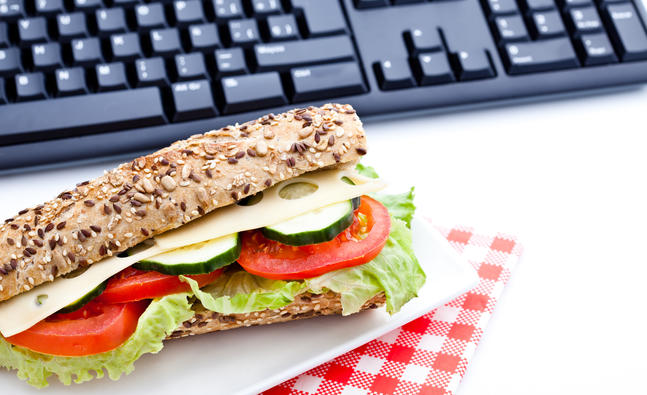How NOT to Inherit Your Weight and Eating Habits from Your Parents
The Genetic Link
Alicia Goon, 25, Minnetonka, MN
Pam Goon, 52, Victoria, MN
As Alicia gained pounds in her hips and thighs as a teen, she realized she'd morphed into a mini-me of her mom: pear-shaped, with short legs. "From behind, you can hardly tell the difference between us," says her mother, Pam. The similarities aren't limited to a tricky-to-shop-for-jeans body: They share matching passions for creamy pasta dishes, cheese, and bread—and both have difficulty staying at a healthy weight, even though each has been active in sports since high school. "For the past four and a half months, we've been working out together six days a week and attending a group weight-loss program. It's working, but I feel like we have to work harder than other people to see results," says Alicia.
Body Of Evidence: Researchers have ID'd 17 genes linked to where you store fat—and the effects of some of those genes are stronger in women than in men.
Then there's the so-called obesity gene, FTO. People who inherit two bum copies of the gene have higher levels of the "hunger hormone," ghrelin, which may be why a study found that they tend to down more calories per day. Some types of FTO may even influence cravings for high-cal foods.
FTO may also affect how likely you are to stick to exercise and how you respond to workouts. The gene may have an impact on mood-regulating brain chemicals, says Molly Bray, Ph.D., a geneticist at the University of Texas. This means exercise may feel harder for you, or you like it less.
Overcome Your Fate: Even if you inherit chubby FTO, your diet and activity level have a bigger impact on your weight than your genes do, says Walter Willet, M.D., author of Thinfluence. Research shows that regular exercise can cut the gene's effects by nearly 30 percent. Plus, says Bray, you could react better to strength training than to cardio, or even short bouts of high-intensity cardio instead of long, low-intensity sessions. If you're not losing weight or gaining strength in four to eight weeks, switch up your workout until you find the right fit.
The Behavioral Link
Tatum Hoehn, 28, Kennewick, WA
Jill Hoehn, 56, Seeley Lake, MT
Tatum was around 10 years old when she first noticed her mom Jill's eating habits and negative body image. "She was always trying a new diet, never wanted to try on clothes, and would beat herself up for grazing on sweets," says Tatum. "She always told me I was beautiful, but I still got the message pretty early on that being overweight is bad." As she saw her own weight creep up as a teen, Tatum followed her mom's example, comforting herself with chocolate and cookies, then turning to another diet to combat the resulting weight gain. "We're emotional eaters, for sure. Happy, sad, excited, you name it—we could figure out some reason to bake and eat," says Jill. By the time Tatum was in her mid-twenties, mother and daughter each weighed north of 200 pounds. Tatum eventually learned some healthier habits when she went to culinary school, and today she shares healthy recipes with her mother.
Body Of Evidence: "Young girls look to their mothers—even more so than their peers—for messages about food, weight, and the importance of being thin," says Katherine Bauer, Ph.D., an assistant professor of public health at Temple University's Center for Obesity Research and Education. Even seemingly harmless messages can do damage. "It can be as innocent as a mother commenting that a celebrity looks heavy—her daughter is going to pick up on it," says Bauer.
Internalizing those messages can lead to unhealthy behaviors. Daughters of dieting moms are more than twice as likely to have ideas about dieting themselves, compared with girls whose mothers don't diet. And actually mimicking her mom's behavior can quickly backfire, since teens who diet are more likely to be heavy as adults. "Dieting may actually cause weight gain, most likely because adolescents tend to diet unhealthfully, alternating periods of restricting and overeating," says Bauer.
Overcome Your Fate: It's possible to reprogram whatever Mom inadvertently taught you. Research shows that simply recognizing the negative effects of disliking your body or going on fad diets—low self-esteem and nutritional deficiencies—can break the pattern. So can surrounding yourself with people who don't focus on weight or looks, and participating in activities that emphasize being strong and healthy versus being thin. "Women can also reduce their own weight talk—whether it's focused on their own bodies or other people's bodies," says Bauer. (So no snarking on bikini bodies in the tabloids, no matter how much fun it is!)
The Relationship Link
Alexa, 40, San Francisco, CA
Alexa hasn't had contact with her mother in nearly a decade.
Growing up with an abusive mother who often withheld food as a punishment, Alexa developed dysfunctional eating habits early on. "When I was younger I didn't know any better, but as I got older I realized it was degrading," she says. She exerted authority by choosing not to eat rather than beg her mother for food. By the time she left home when she was 21, her rebellion had begun manifesting as several eating disorders: anorexia, bulimia, and bingeing. Years of therapy have helped her forge a healthier relationship with food and her body.
Body Of Evidence: Moms who restrict food—whether deliberately or less maliciously (say, a mom who limits her pudgy daughter's carbs out of concern for her health)—can create anxiety and resentment, says clinical psychologist Roni Cohen-Sandler, Ph.D. "Daughters can try to take back the control they feel their mother has taken from them by dieting, overeating, or hiding food," she says.
"Toxic family influences can greatly affect your weight," says Willet. Maternal abuse (or even a far-less-severe lack of nurturing) can be a catalyst for weight loss or gain. In fact, a 2011 study shows that toddlers who had poor relationships with their mothers were more than twice as likely to be obese by the time they were teens. One theory why: Parts of the brain that govern weight are also involved in managing stress and emotions, and extreme anxiety has been linked to disregulation in these areas, say study authors.
Overcome Your Fate: While you can't undo the past, you do have the opportunity to break the cycle by becoming aware of what drives your weight-bombing behaviors, then developing strategies to defuse them. Dispatch Mom to voice mail if picking up makes you feel tense, or take a walk around the block (instead of to the fridge) after a heated argument, advises Willet. If you need more help, "a therapeutic nutritionist can guide you in a sensible meal plan and, at the same time, debunk the myths about food and eating you've grown up with," says Cohen-Sandler.
Name and identifying details have been changed.
-
Venus Factor Weight Loss Program Review – Everything You Need To Know
It is time again! Time for what? Time to bring forward to you yet anot
-
I want to get thin – should I diet or exercise?
-
How Watching The Mindy Project May Help Prevent Weight Gain
Great news—your latest Netflix addiction may actually prevent you from
-
Use warm-up exercises to burn calories
-
10 SIMPLE DIET CHANGES THAT WILL HELP YOU LOSE WEIGHT
10 Simple Diet Changes That Will Help You Lose Weight We’re no
-
Weight-Loss Success Story: I Feel Stronger Than I Ever Have Before!
Before: 180 pounds After: 128 pounds The Lifestyle Virginia resident
- DON'T MISS
- The Grocery List That Will Help You Drop Pounds, Build Muscle, and Gain Tons of Energy
- Two daily habits to help shed weight without a diet
- Order your meals first
- Fashionable nutrition myths: Sugar is the reason you are overweight
- Should you weigh yourself daily?
- Exhale your excess weight: WIN a device worth R499,00!
- 3 Fruit snacks under 100 calories
- Throwback: Celebs before and after weight loss
- Eat out the healthy way
- Summer countdown: Look great in 6 weeks




